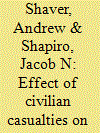| Srl | Item |
| 1 |
ID:
191917


|
|
|
|
|
| Summary/Abstract |
Any act of battlefield violence results from a combination of organizational strategy and a combatant's personal motives. To measure the relative contribution of each, our research design leverages the predictable effect of ambient temperature on human aggression. Using fine-grained data collected by US forces during the Afghanistan and Iraq conflicts, we test whether temperature and violence are linked for attacks that can be initiated by individual combatants, but not for those requiring organizational coordination. To distinguish alternative explanations involving temperature effects on target movements, we examine situations where targets are stationary. We find that when individual combatants have discretion over the initiation of violence, ambient temperature does shape battlefield outcomes. There is no such effect when organizational coordination is necessary. We also find that ambient temperature affects combat-age males’ endorsement of insurgent violence in a survey taken during the conflict in Iraq. Our findings caution against attributing strategic causes to violence and encourage research into how strategic and individual-level motivations interact in conflict.
|
|
|
|
|
|
|
|
|
|
|
|
|
|
|
|
| 2 |
ID:
180671


|
|
|
|
|
| Summary/Abstract |
Scholars of civil war and insurgency have long posited that insurgent organizations and their state enemies incur costs for the collateral damage they cause. We provide the first direct quantitative evidence that wartime informing to counterinsurgent forces is affected by civilian victimization. Using newly declassified data on tip flow to Coalition forces in Iraq we find that information flow goes down after government forces inadvertently kill civilians and it goes up when insurgents do so. These results confirm a relationship long posited in the theoretical literature on insurgency but never directly observed, have strong policy implications, and are consistent with a broad range of circumstantial evidence on the topic.
|
|
|
|
|
|
|
|
|
|
|
|
|
|
|
|
| 3 |
ID:
181555


|
|
|
|
|
| Summary/Abstract |
A large literature suggests that the presence of refugees is associated with greater risk of conflict. We argue that the positive effects of hosting refugees on local conditions have been overlooked. Using global data from 1990 to 2018 on locations of refugee communities and civil conflict at the subnational level, we find no evidence that hosting refugees increases the likelihood of new conflict, prolongs existing conflict, or raises the number of violent events or casualties. Furthermore, we explore conditions where provinces are likely to experience substantively large decreases in conflict risk due to increased development. Analysis examining nighttime lights as a measure of development, coupled with expert interviews, support our claim. To address the possibility of selection bias, we use placebo tests and matching. Our research challenges assertions that refugees are security risks. Instead, we show that in many cases, hosting refugees can encourage local development and even conflict reduction.
|
|
|
|
|
|
|
|
|
|
|
|
|
|
|
|